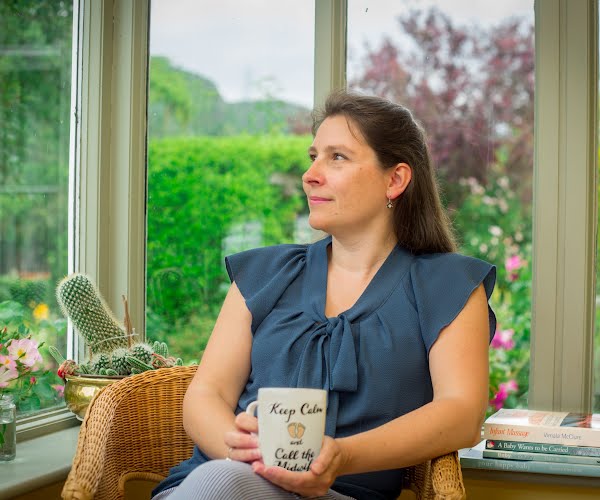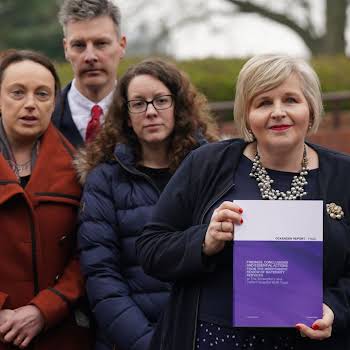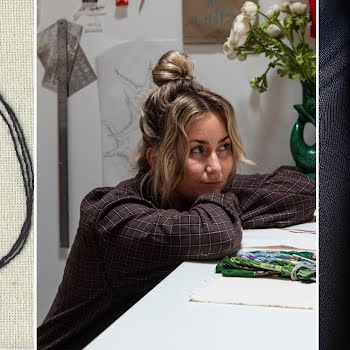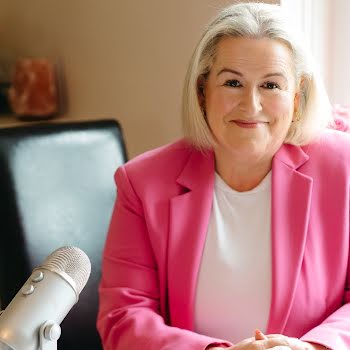
Life as a night nurse: ‘Parents are beginning to realise this isn’t just a service for the wealthy’
Belgium-born, Wicklow-based midwife Liselotte Hill provides antenatal and postnatal classes, services and support, including maternity night care for new parents who want to get a good night's sleep.
23rd Sep 2023
“Ever since I was a child I knew I wanted to work in the area of maternity and childcare. I first worked as a paediatric nurse, and then a Midwife and Lactation Consultant, but after working in postnatal units, I began to realise how busy things can be in the hospital, and how little time there was for mothers to get some rest.
A lot of new mums leave the hospital exhausted, which is what led to me working outside the hospital setting, minding babies in their own homes with their parents.
Nowadays, I provide lots of services for new parents, including maternity night care. In this scenario, I generally arrive at the house at 10pm and leave at 7am, looking after the baby or babies while the parents sleep.
Advertisement
In some cases, parents are just so happy to see you arrive. It’s like, ‘Here’s the baby, here’s the bottle, here’s the cot…’. It’s a quick handover after which the parents go to sleep. In other cases, they have their list of questions ready and they want to go through them with me. Normally, on the first night, I will meet with the parents half an hour in advance so I can find out about the family and how things are going and how I can help best.
The parents I work with are looking for different types of help. Some of them are first-time parents who want me to be there for the days after they return from the hospital. Some of the mums had severe postnatal depression on their first birth so on their second birth they are much more prepared and have me lined up for some nights from the very start after they get home from hospital.
So many people call me a few weeks after their first baby when they’re having a really difficult time and they say, ‘I wish I had known about you in the early days’.
Sometimes I’m there during the night with mums who are learning to breastfeed. In this scenario, they don’t really count on a full night’s sleep. They just want me to be there to help them with feeds and help to settle the baby. They still get up a few times during the night but they feel like they can switch off between feeds, which makes a big difference.
I once stayed with a family of twins for nearly a year, which is very exceptional.
I also do a lot of maternity night care for twins and triplets. I once stayed with a family of twins for nearly a year, which is very exceptional. It was in the beginning of my services so I was lucky I could stay on for so long, and that they wanted me to stay on. Nowadays, I wouldn’t stay for more than three months because I really want to be available for the newborns.
Advertisement
If I’m staying with a family in the first days after birth, I try to offer reassurance and guidance. There are often tears, as it’s a very emotional time as well.
Sometimes, if I notice a mother is exhausted and she’s expecting visitors, I might say it to her partner. New mums sometimes feel like they have to be the host so it can be easier for the dad to say, ‘Sorry, not today’.
I always tell parents that I will adapt myself to their family. If they have a spare bedroom, I might stay there with the baby in a Moses basket. If they want to watch a bit of TV while I mind the baby, I’ll be out of the living room with the baby in the spare room, other times they are straight off to bed and I just stay in the living room with the baby. I don’t need a bed — just a comfy coach will do me for the night!
If the mother isn’t breastfeeding during the night, or she is a bottle-feeding mother, I always say, ‘Go to bed, put in your earplugs, and if I really need you, I’ll knock on your door’. Most of the time they are able to get a good rest, but sometimes parents will come down if they hear the baby crying, because it can be hard to switch off when it’s your own baby. It’s natural for them to come and check, but after a couple of nights of me being there, they start to sleep really well. They are usually so thankful in the morning and they feel they got some well-needed rest.
I don’t offer sleep training, although a lot of parents assume I do when they initially make contact. But yes, I have a few techniques to soothe a baby to sleep. With young babies under three months, I advise meeting their needs as soon as possible. Because once you let them build up they get too upset and it can become more difficult to calm them down. I wouldn’t say pick them up as soon as they start crying, but don’t wait too long.

I think night nurses are becoming more popular in Ireland. For a long time it was something people didn’t really know about, or they thought it was for the more wealthy people who are already living with nannies and home help.
Advertisement
Now, I think they realise that they could get someone to come to them in the first few weeks, just every now and then. And it doesn’t have to be a long-term contract. They might only be able to afford two or three nights in the first 10 days or so, but that can make a big difference to their overall health.
I personally think maternity night care is one of the best presents you can give to someone with a newborn baby.
I’ve always offered vouchers on my website but it’s really only in the last two years that I’ve noticed more and more people requesting vouchers to give as presents. Groups of friends will sometimes put money together to buy two or three nights of maternity night care for their friend. I personally think it’s one of the best presents you can give to someone with a newborn baby.
I want to provide this service for people who really need it, and not just for people who are able to afford it.
Maternity night care can cost anything from €200 to €250 a night, depending on where the family lives. If you go to a nursing agency or nanny agency, it can be more expensive. Some of them charge extra for twins or triplets. I don’t charge extra in this case because I want to provide this service for people who really need it, and not just for people who are able to afford it.
Of course, I’d love if everyone was able to afford it. I was born in Belgium and we have a subsidised service called Kraamzorg, which is a combination of a midwife and a maternity care worker. For up to three months, new parents can have regular visits. The midwife looks after the medical side and the maternity care worker can help with newborn baby care or mind the baby for a few hours. It’s a means-assessed service and the maximum people pay is €9 an hour.
Advertisement
It’s such a good service and most families avail of it. There is no similar affordable service like this available in Ireland unless the family takes on a Postnatal Doula, which is very helpful but also expensive.
I also teach antenatal classes and I’m always talking to people about the importance of what we call the ‘fourth trimester’. It’s not just about the birth of the baby, but also how you are going to be transformed into a parent and how important it is to look at that as a process, and not as an event that’s going to happen overnight.
Thankfully, there is more attention being given to the well-being of mothers themselves and not just about the baby being healthy and meeting all of its milestones.
I think social media has helped. A lot more people are posting about the importance of nesting and taking that fourth trimester really easy and not putting too much pressure on themselves.
Some years ago, I didn’t think social media was very helpful, especially with celebrities posting stunning but often fake pictures of their postnatal recovery, putting a lot of pressure on people. I think that has eased off a bit now. I hope so anyway…”
Advertisement
This article was originally published in June 2022.





















